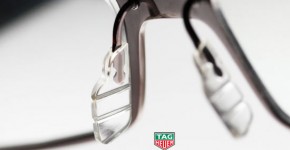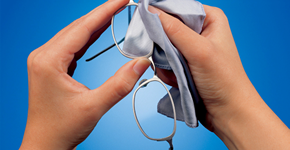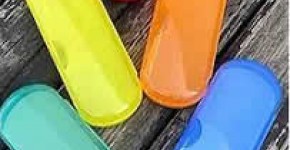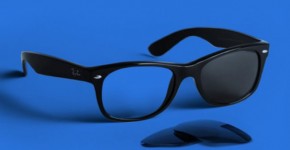How to Clean Eyeglasses and How to Store Them Smoothly?

If you wear eyeglasses, you probably know how irritating and irritating it is to have dirt, dust, or oil on your eyeglass lenses. You should not forget that eyeglass lenses (glasses) can be annoying and uncomfortable, as well as cause eye strain and headaches.
What's more, it's possible for bacteria to grow on glasses that haven't been cleaned for a while. Feeding germs in a sensitive area, such as your nose and eyes, poses a risk.
Research by the National Institutes of Health in 2018 confirmed that dangerous bacteria can grow on your glasses, including the bacteria that cause staph (Staphylococcus aureus) infections. The nose pads and ear clips of the glasses tested were found to be the most contaminated, infectious areas of the glasses.
Keep reading our article to learn how to clean your glasses safely and hygienically.
How should eyeglass lenses be cleaned?
The lenses of your glasses are the key to seeing your world sharply and clearly.
Materials you will need:
Microfiber Cloth. It is the safest, most effective tool you can use to keep grease and grime on eyeglass lenses clean without smearing or scratching them.
Eyeglass Cleaning Spray. It is the best choice for solution spray cleaning for polycarbonate, organic, mineral and sheet film eyeglasses and lens coatings; but you can also use lotion-free dishwashing liquid.
Ultrasonic Washing Machine. This process can be done by means of the washing machine available in optical shops selling eyeglasses. It can be costly for a casual eyeglass wearer to have an ultrasonic washing machine from their home. Many of our partner companies are happy to provide free eyeglass washing for their customers.
Instructions:
An Important Tip: Before making any contact with the lens of your glasses, keep in mind that there are dust particles on the lenses that are invisible but exist as microns. Before contacting the windows, we recommend that you blow on the windows. This will minimize possible scratches.
1. Wash your hands thoroughly for 20 seconds to avoid transferring germs from your hands to your glasses.
2. Wipe your glasses with a microfiber cloth to get rid of dust or other irritants that could scratch your lenses.
3. Run warm water over your glasses. If hard water is available in your area, use distilled (pure) water instead of tap water. (Since the washing method may cause oxidation of metal parts, it should be dried immediately after washing, although not very often)
4. Spray both sides of your glasses with the cleaning solution. If you're using dish soap, put a single drop on both sides of the lenses and rub gently onto the lens surface.
5. Shake off excess water droplets. Dry your glasses with a microfiber cloth to prevent residual wetness and water drop marks on the glass.
Cleaning eyeglass frames
Frames have many small parts such as nose pads, screws, springs and hinges that can get dirty with sweat and oils from your face. Many people skip this step when cleaning your eyeglass frames.
Cleaning the frame is mostly important for personal hygiene because the frame is constantly touching your skin. Most people, even those who usually take good care of their glasses, tend to overlook cleaning their nose pads (glasses shoes). This can lead to all sorts of dermatological problems.
The process of cleaning your eyeglass frames is quite simple:
1. Use a mild soap such as dish soap without lotion and apply it to your frames using your fingertips.
2. Rinse the frames thoroughly under warm water. (Since the washing method may cause oxidation of metal parts, it
should be dried immediately after washing, although not very often)
3. To clean the nose pads and earpieces of your frames, clean them with a spray-soaked swab or cloth.
Avoid behaviors that could damage your glasses
There are a few common mistakes people make when cleaning or using their glasses.
First of all, when you take off your glasses, do not put them on the ground! This behavior causes your glasses to get dirty, scratched and deformed in a short time.
Avoid these materials;
Paper towels, wipes, and the fabric of the shirt/clothing you're wearing may seem like an easy way to clean up stained lenses. However, such materials can cause long-term damage to your glasses. You should make it a habit to use the microfiber eyeglass cleaning cloths that were given to you when you first bought your glasses.
“The most common mistake for cleaning lenses is people using tissue or paper towels.” These materials are very rough and can cause minor scratches on the surface of the lenses.”
Do not use products with acetone
Another common mistake when cleaning glasses is using nail polish remover (acetone) to clean lenses and frames. The use of acetone should never be used for glasses and frames. Acetone (usually found in nail polish remover) is surprisingly destructive to both eyeglass lenses and plastic eyeglass frames if left on the surface for too long.
Saliva does not clean eyeglass lenses
When you're desperate to get rid of stains on your glasses, it may seem like a good idea to use your own saliva to lubricate the lens.
In fact, that's not a good idea either, because you cover your glasses with germs from your mouth, and you're preparing them to multiply later in the environment. Practically speaking, your saliva doesn't really remove the stain either.
You should know that your glasses should also be professionally cleaned.
Optometrists, opticians, the eyeglass retailers where you buy your glasses, can offer professional cleaning. As we mentioned above, many opticians have ultrasonic washing machines where you can have your glasses cleaned for free. You can take your glasses to the place of purchase for professional cleaning.
If your glasses have an oily appearance that does not disappear despite cleaning the ear temples or nosepieces, a professional glasses cleaning may be a permanent solution.
The best way to store glasses:
Throwing your glasses in a bag without any box or case protection or leaving them in a random place is one of the most important reasons for scratching and staining. Storing your glasses safely is just as important as cleaning them properly.
Always store your glasses in a hinged, rigid box (steel glasses case). You can find these eyeglass cases at eyeglass accessory stores or at optical retail stores where you buy your eyeglasses.
If you don't have a hard steel case or it's a burden to carry, you can safely protect your glasses as long as you keep them alone in your bag or zipper pocket, where there is no coin, key or any metal material that will not cause boots. Worst of all, you can prevent your glasses from getting scratched with velvet or soft-textured pouch cases.
Ideally, you will store the glasses in a box. Otherwise, you can place your glasses with the lenses facing up on a clean, stable counter or furniture surface. Unclip both sides or stems of your glasses and place them upside down for proper storage overnight without a case.
In short…
Cleaning your glasses regularly should be part of your daily routine. Not only will this help you see more clearly, but it can also prevent eye infections and dermatological conditions like blackheads and acne.






